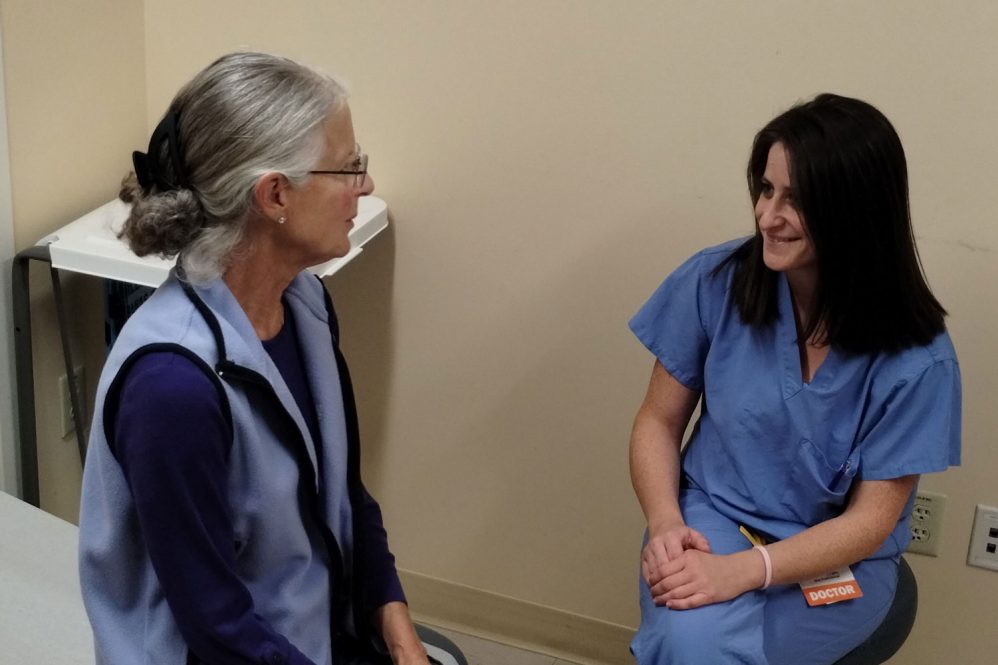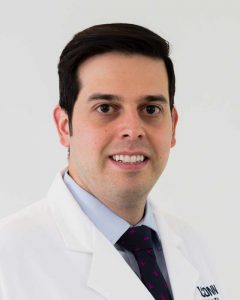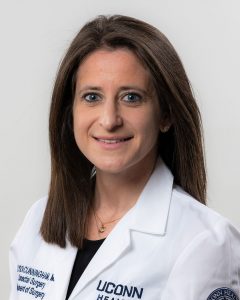Emergency colonoscopy revealed need for a resection; 'I'm very, very blessed'

Beth Grenham (left) is grateful for the care provided by Dr. Alyson Cunningham (right) and others at UConn Health during an ordeal she experienced days before Christmas 2023. (Photo by Chris DeFrancesco)
Beth Grenham of West Hartford is ready for the holidays, now that she's fully recovered from a problem from nearly a year ago that landed her in the hospital days before Christmas.
She credits her care at UConn Health for not only healing her, but also for helping her back to her active lifestyle.
Everybody knew what was going on because everybody talked to each other. I can't say enough about them. — Beth Grenham
Eight days before Christmas 2023, Grenham, then 64, had started to notice growing abdominal discomfort. Four days later, she was in the UConn John Dempsey Hospital Emergency Department.
"I had children without any anesthesia, and this was nothing like that," Grenham says. "This was so much more painful. During the week it got progressively worse. It started on Sunday, and by Wednesday, I was in very bad pain."

The problem was a sigmoid volvulus, meaning part of her large intestine was twisted. This causes obstruction, can hinder the blood supply, and potentially could lead to sepsis.
Dr. Houman Rezaizadeh performed an emergency colonoscopy, which revealed the tissue was still viable, and corrected the problem during the procedure.
"Since she had a volvulus, if she did not come to the hospital she could have had a bowel perforation, which is very serious and potentially life-threatening," Rezaizadeh says.
She woke up relieved of the severe pain, but with a new concern: The nature of her anatomy was such that she was susceptible to having a repeat problem.
"After the colon gets unkinked, it's still lax, so they have to remove that part of the colon because it's just a matter of time before it does it again," Grenham says.

That's when she met Dr. Alyson Cunningham.
"Because there's a relatively high risk of it recurring, and it could be compromised if it does recur, our recommendation typically is to have a formal colon resection: the surgery to remove that part of the colon that is redundant, during that hospital admission before the patient leaves," Cunningham says.
Grenham did not need much convincing.
"I was not going through that again," she says. "It was a unanimous vote that I could just stay in the hospital and have that part of my colon surgically removed."
As a colorectal surgeon, an open sigmoid resection is well within Cunningham's expertise. The surgery was an unequivocal success.
"She recovered remarkably well," Cunningham says. "She left one day after surgery."
It was Dec. 24; instead of a hospital bed, Grenham was able to sleep in her own bed on Christmas Eve.
"The nurses and Dr. Cunningham said, 'If you take it easy to recover for two weeks, you're going to be fine; but you've got to put the work in on the front end,'" Grenham says.
For her, that meant stopping herself from her active tendencies. She had to limit physical activity and eat a restricted diet.
Over several weeks Grenham gradually worked her way back toward being the active person she is. At a follow-up appointment in April, Cunningham told her she doesn't need to see her until 2026.
"I would always go to UConn," Grenham says. "The gastroenterologists, the surgeons, the dietary people, the nurses - the nursing care there is phenomenal - everybody knew what was going on because everybody talked to each other. I can't say enough about them.
"I'm very, very blessed with all the people who came through, all the residents, the interns. The fact that it's a teaching hospital is very important to me, because you get all the young blood in there, and everybody really has that love of learning. They're glad to be there and they want to make you feel better."
Cunningham describes Grenham's recovery as "smooth and relatively uneventful," and sees this case as a teachable moment.
"If she had not come in at that point, there was a risk of disease progression and then potentially a need for emergency surgery and complicated surgery, and more complicated recovery," Cunningham says. "If you're feeling significantly different than yourself, then it's worth getting checked out. We're here and available to evaluate and support people."
Learn more about UConn Health's Division of Gastroenterology and Hepatology.






